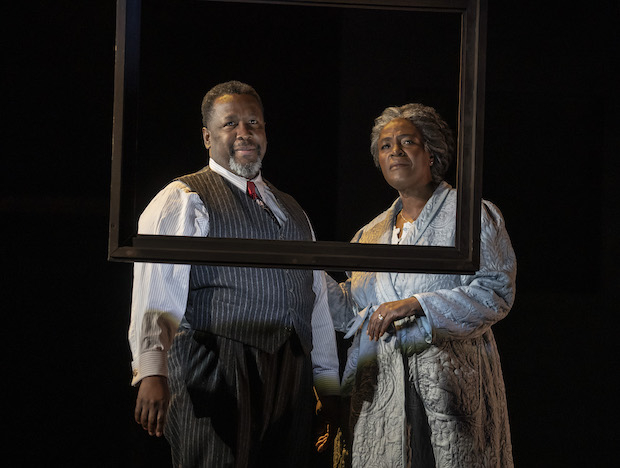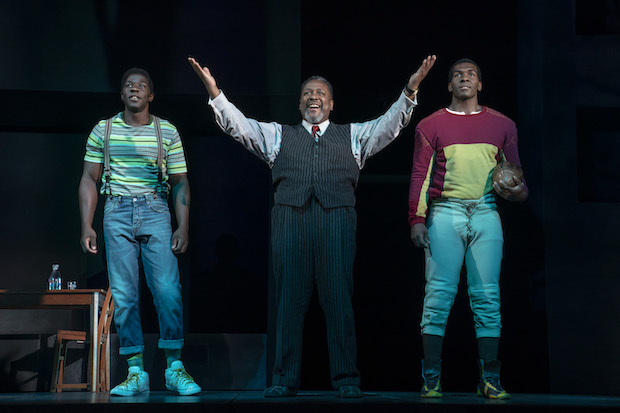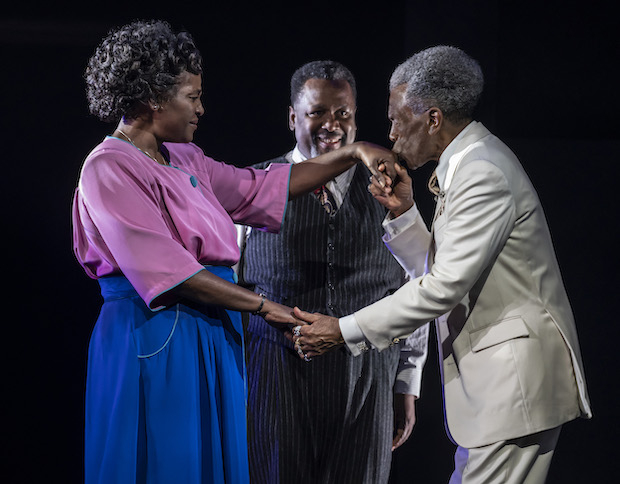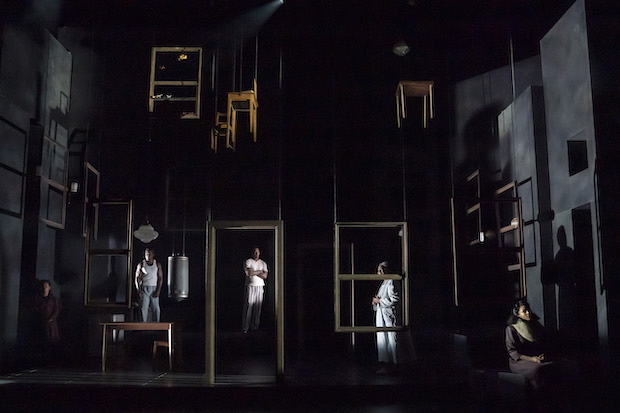Review: Arthur Miller's Death of a Salesman Returns to Broadway, as Devastating as Ever

(© Joan Marcus)
Where did it all go wrong? This question haunts Willy Loman through all three hours of Arthur Miller's Death of a Salesman, now receiving an extraordinary Broadway revival at the Hudson Theatre. He scans his memory, a particularly frightening and slippery realm as envisioned by director Miranda Cromwell (who shared credit with Marianne Elliott when this production premiered at London's Young Vic Theatre in 2019). British, Cromwell nevertheless understands deeply that in the American mythos, tragedy is not a matter of fate but personal choice. Everything that happens to you is either the result of your own initiative or, conversely, your own fault. This full-throated rejection of the lessons of Greek drama is bound to leave most of us feeling hoarse and spent at journey's end.
No one seems more exhausted than Willy Loman (Wendell Pierce) when he returns to his Brooklyn home lugging two large suitcases full of samples. Once a pretty good travelling salesman, Willy's powers have diminished over his 34 years. The boss just cut his salary, meaning he will only be paid on commission. His wife, Linda (Sharon D Clarke), is worried; and their two disappointing sons, Biff (Khris Davis) and Happy (McKinley Belcher III), aren't helping matters.
Willy wonders what he did that transformed Biff from star athlete to aimless wanderer (at 34, he has just returned from his latest farmhand job out west). If he had emphasized academic achievement, rather than just being liked, would Biff now be a successful young professional like the neighbor boy, Bernard (Stephen Stocking, seamlessly making the transition from dork to yuppie)? Should he have pushed less, like Bernard's father Charley (Delaney Williams as a surprisingly profound TV dad)? Maybe he should have followed the advice of his brother, Ben (André De Shields), and sought his fortune in the Alaskan wilderness. One thought he won't entertain is the notion that he has no control over his destiny — or that he can't still turn things around.

(© Joan Marcus)
This production marks the sixth time Death of a Salesman (which premiered at the Morosco Theatre 1949) has appeared on Broadway, and it is the first time Black actors have portrayed the Lomans on a Broadway stage. It is not, however, the first time Black actors have played these roles: That distinction goes to a 1972 production at Baltimore Center Stage, which led the critic for the New York Times to observe, "Willy Loman's values are white values — the elevation of personality, congeniality, conformity, salesmanship in the sense of selling oneself. Willy becomes a black man embracing the white world as an example to be emulated." Times may change, but 50 years later such racist nonsense is still distressingly fashionable.
Miller always insisted that Salesman is a universal story that can resonate in any culture with any actors, provided they are good (and they are excellent here). Cromwell and company do not shy away from moments that take on a racial charge under this casting: Willy stooping down to pick up his white employer's Zippo so he can light his cigarette; the panic that comes from Biff accidentally stealing a gold fountain pen; Willy telling his white mistress "I think there's a law in Massachusetts about it." Nor do they make any special effort to reframe Salesman as a Black play. Willy is a middle-class American who works hard, sneers at the apartment-dwellers down the block, and dreams of great success for his progeny — as middle-class (and aspiring) Americans of all races and ethnicities have since the founding of the republic. Miller's claim of universality still holds and seems to be truer in 2022 (with a swelling global middle class) than it was in 1949.
That's also what keeps this tragedy devastating as Willy's strenuous efforts (a reflection of our own) amount to very little. Pierce puts up a heroic fight in his performance, delivering a Willy who is unreasonably optimistic in the morning and is still looking for a way to fix things come nightfall. He never stops planting seeds, even when he realizes he will never personally enjoy the fruit of his labor. He may be suicidal, but he is never defeated — and this play, like a dark answer to It's a Wonderful Life, makes that distinction clear.

(© Joan Marcus)
As Ben, the innately mystical De Shields plays both the angel and devil on Willy's shoulder: He made a fortune in African diamonds, and we see them embedded in his pristine white suit (this outfit represents the most fantastical of Anna Fleischle's generally muted period costumes). Cast against type (I always imagine Ben as a burly frontiersman) De Shields acts as a slender, slinky mockery of Willy's cult of physical strength.
Powerfully built, Davis embodies a Biff still marinating in adolescence, even though he is a grown-ass man. We never question the numerous flashbacks to his teenage self, when Willy was preparing him to be the next football legend. As these heartwarming father-son scenes play out, Happy interjects, "I'm losing weight, you notice, pop?" And, of course, Willy doesn't. Ever the spare to Biff the heir, Happy engages in his own struggle against fate, which Belcher pursues with quiet dignity.
Nothing is as heartbreaking as Clarke's portrayal of Linda: An unexpectedly resonant quaver to her voice, she genuinely loves Willy and wants him to find safe harbor. They are so close to paying off the mortgage. Unlike most other productions, this Linda sings; and in the final moment we are left with just Linda and her song in a downstage spotlight — an image more wrenching than anything you're likely to witness on Broadway this season.

(© Joan Marcus)
Femi Temowo's original music (which contains elements of jazz, blues, and gospel) brings a distinctly Black sound to a play that always called for music, greatly enhancing the emotional power already present. Fleischle's light and versatile set allows for Willy's memories to fly in and out, like thoughts passing with the clouds. Lighting designer Jen Schriever creates small flashes, snapshots in time, as Willy remembers moments from his life. Tight spotlights smack of a criminal interrogation as Willy endlessly reexamines his choices. They all come flooding back in a terrifying chorus under the cataclysmic sound design of Mikaal Sulaiman.
We've all been there. With market logic invading all aspects of life, from employment to dating, we are all now forced to be salesman of ourselves around the clock — not just a nation of Willy Lomans, but an entire world. 73 years after it was written, Death of a Salesman is still the great tragedy of our time.











